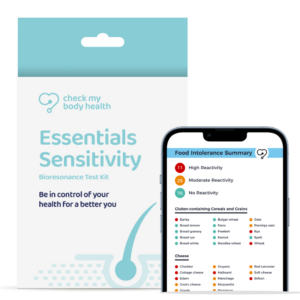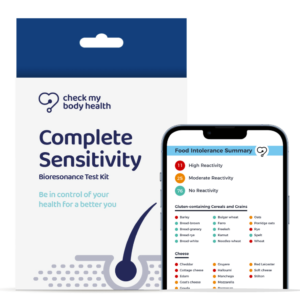
Medically reviewed by Sian Baker, Dip ION mBANT mCNHC
on April 2, 2024. To give you technically accurate, evidence-based information, content published on the Check My Body Health blog is reviewed by credentialed professionals with expertise in medical and bioscience fields.
An asparagus allergy is when you experience symptoms after eating asparagus or food containing asparagus. Symptoms can range from itchy skin to stomach pain. Although serious allergies can cause breathing difficulties or anaphylaxis, this is fortunately rare. In this article, we’ll delve into the signs and symptoms of asparagus allergies, their prevalence, and which foods to avoid if you suspect an allergy to asparagus.
Can you actually be allergic to asparagus?
Yes, it’s possible to develop an allergy to asparagus. Allergies occur when the immune system mistakenly identifies a harmless substance, like asparagus, as dangerous, triggering an allergic reaction.
How common is this allergy?
Asparagus allergy is relatively rare compared to allergies to foods like peanuts, tree nuts, or shellfish. However, because it can occur, it’s important for those with suspicious symptoms to consider asparagus as a potential allergen.
Signs & Symptoms of an Asparagus Allergy or Intolerance
Symptoms of an asparagus allergy may include:
- Nausea, vomiting, or diarrhoea
- Hives, rash, or itchy skin
- Abdominal pain and cramps
- Breathing difficulties or tightening of the throat
- Pale or discoloured skin
- Lightheadedness or dizziness
Anaphylaxis is a rare but serious reaction that requires immediate medical attention.
What are the symptoms of an asparagus intolerance?
Asparagus intolerance, unlike an allergy, does not involve the immune system and typically results in less severe symptoms, primarily affecting the digestive system:
- Stomach or intestinal pain
- Bloating
- Constipation or diarrhoea
- Fatigue
What is food intolerance?
Food intolerance arises when the body struggles to digest certain foods, leading to discomfort. It’s important to note that intolerance symptoms stem from the digestive system’s response rather than an immune system reaction.
How common is an asparagus intolerance?
Specific data on asparagus intolerance is scarce. Still, given that any food has the potential to cause intolerance, individuals with sensitive digestive systems may experience symptoms after consuming asparagus.
How do you test for an asparagus allergy or intolerance?
To identify an asparagus allergy or intolerance, consider the following steps:
- Consult with a healthcare professional, particularly an allergist, to discuss symptoms and potential diagnostic tests.
- Maintain a food diary to track your meals and any symptoms that follow.
- Try an elimination diet by avoiding asparagus to see if symptoms improve.
- Consider undergoing a food intolerance test, which can help pinpoint specific sensitivities.
What should you do if you think you have an asparagus allergy or intolerance?
If you suspect you’re allergic or intolerant to asparagus, it’s best to avoid consuming it and consult a healthcare provider for a proper diagnosis and management plan.
What foods should you avoid if you have an asparagus allergy or intolerance?
Individuals with an asparagus allergy or intolerance should steer clear of asparagus and dishes that contain it, including certain soups, salads, and side dishes.
10 alternatives to asparagus
- Green beans
- Broccoli
- Zucchini
- Brussels sprouts
- Snap peas
- Carrots
- Bell peppers
- Spinach
- Kale
- Cauliflower
Managing and Treating Asparagus Allergy
If you or a loved one has been diagnosed with an asparagus allergy, managing the condition becomes a crucial part of daily life. The key to effective management is avoiding asparagus in all its forms. However, accidental exposure can happen, and it’s essential to be prepared.
Emergency Treatments:
For severe allergic reactions, such as anaphylaxis, carrying an epinephrine auto-injector (e.g., EpiPen) is vital. Epinephrine is the first-line treatment for anaphylaxis, capable of quickly reversing the symptoms. Always have two doses available, as symptoms can recur. It’s also important to wear a medical alert bracelet or necklace that informs others of your allergy in case you’re unable to communicate during a reaction.
Long-term Management Strategies:
- Dietary Adjustments: Learning to read labels is crucial as asparagus can be found in some less obvious foods and dishes. Become familiar with the terms that might indicate the presence of asparagus and be vigilant about checking ingredient lists.
- Handling Accidental Exposure: If accidental exposure occurs, follow your allergy action plan as prescribed by your allergist. This may include taking antihistamines for minor reactions or using an epinephrine auto-injector for more severe symptoms, followed by immediate medical evaluation.
Living with Asparagus Allergy
Living with an asparagus allergy requires mindfulness about what you eat and how food is prepared. Here are some strategies to help navigate this challenge:
- Reading Food Labels: Always check the ingredient list on food packaging. Asparagus can be included in vegetable mixes, soups, and sauces.
- Communicating with Restaurants: When eating out, inform your server or the chef about your allergy. Ask about ingredients and cross-contamination risks.
- Safe Eating While Travelling: Bring allergy-safe foods with you, especially when travelling to places where you’re unsure of the food options or language may be a barrier. Research restaurants in advance and consider staying in accommodations with kitchen facilities to prepare your own meals.
Prevention of Asparagus Allergy in Infants and Children
The prevention of food allergies in infants and children is a growing area of interest. Here are current strategies recommended by healthcare professionals:
- Introducing Allergenic Foods Early: Recent guidelines suggest introducing potentially allergenic foods like peanuts, eggs, and dairy early in a child’s life (around 6 months but not before 4 months), which may help prevent the development of food allergies. While specific recommendations for asparagus aren’t usually made, the general principle of early introduction applies to a variety of foods.
- Dietary Diversity: Offering a wide range of foods early in life may help prevent food allergies. This includes fruits, vegetables, grains, and proteins, provided they are age-appropriate and prepared safely.
- Role of Maternal Diet: There’s some evidence that a diverse diet during pregnancy and breastfeeding may offer protective benefits against food allergies in children. However, more research is needed in this area. Mothers should focus on a balanced diet and consult with healthcare providers about their dietary choices.
Managing an asparagus allergy, like any food allergy, involves a combination of avoidance, education, and preparedness. With careful planning and communication, individuals with an asparagus allergy can lead safe and fulfilling lives.
How to test if you have an asparagus allergy or intolerance
If you experience unpleasant symptoms after eating asparagus, it’s wise to investigate further. Start by tracking your dietary intake and symptoms, consider eliminating asparagus from your diet, and consult with a healthcare provider for appropriate testing and diagnosis.
For individuals concerned about a potential asparagus allergy or intolerance, avoiding asparagus and seeking advice from a healthcare provider is crucial. Proper diagnosis and dietary adjustments can help prevent reactions and improve quality of life. Additionally, consider exploring our range of food intolerance tests for a comprehensive understanding of your dietary tolerances.




